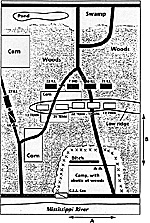Introduction
The game starts at 1030 hours and lasts until 1700 hours (26 game turns.) The Confed-erate artillery has a better than average chance of running out of ammunition. Any routed unit arriving at the river's edge should make an immediate morale check. If the unit fails, it should be removed from the game. Units at the river bank can not be fired at, unless the unit firing is at the edge of the bank. (There is a steep hill at the river bank, the Mississippi River being low at the time of the year.) Union regiments arriving at the Rebel camp that are not engaged in combat will halt and go into disorder (to simulate looting) until they are withdrawn.
A longer version of the game can be played, which starts at 0800 hours and last until 1700 hours (34 turns.) In this version, place Union forces at the end of the game board by the swamp. The Confederates start to the north of the camp in the woods and on the road (moving to meet the Yanks.) The first reinforcements don't arrive until game turn 14, 1115 hours. Cheatham's brigade arrives on turn 17 at 1200 hours. The remaining units arrive at 1500 hours, game turn 29. The game board measures 4 feet by 6 feet.
Terrain Movement Rates
-
Woods: rough
Abatis: rough
Ditch: rough
Swamp: rough
Pond: N/A (too deep)
Ridge: broken
C.S.A. camp: rough
Cornfields: rough, but open for visibility (was harvested before the battle)
Victory Conditions
A major Union victory is won if the Rebel camp is looted and three quarters of the Union force is left. A minor Union victory is gained if the Rebel camp is looted and half of the Union force is left. The Federals must have at least one regiment in the Confederate camp for two full game turns to loot the camp.
To win, the Confederates must save their camp.
Deployment
As indicated on the map, place Union forces in front of the cornfield. Artillery is placed as follows: place two sections between the 22nd Illinois and the 7th Iowa; place one section between the 7th Iowa and the 30th Illinois.
For the Confederate forces, place three sections of artillery between the 13th Tennessee and the 21st Tennessee. The remaining two sections are placed in camp. Infantry is placed on the back edge of the ridge as shown on the map.
Order of Battle: Union Army
Brigadier General U. S. Grant, +2
Brigadier General McClernand, +1
Colonel Dougherty, +1
McClernand's Brigade
-
27th Illinois, 700 men, RM, green
30th Illinois, 500 men, RM, green
31st Illinois, 600 men, RM, green
Illinois Cavalry, 200 men, MLC, green
1st Illinois Art. (Taylor's Battery of Chicago Light Art.), 4 x 6 lb. smoothbores, 2 x 12 lb. howitzers, green
Second Brigade
-
22nd Illinois, 600 men, RM, green
7th Iowa, 500 men, RM, green
Order of Battle: Confederate Army
Note: Confederate weapons are based on what regiments carried at Shiloh in 1862.
Brigadier General Cheatham +1
Brigadier General Pillow, +1
Pillow's Brigade
-
13th Tennessee, 500 men, RM, green
12th Tennessee, 500 men, RM, green
21st Tennessee, 500 men, SB, green
22nd Tennessee, 500 men, SB, green
13th Arkansas, 500 men, SB, green
Mississippi/Tennessee Cavalry, 200 men, MLC, green
Artillery, 10 mixed guns (6 lb. smoothbores and 12 lb. howitzers), green
Confederate Reinforcements
Turn 3 at point A: 2nd Tennessee, 500 men, SB, green
Turn 6 at point B: Cheatham's Brigade
-
15th Tennessee, 500 men, RM, green
11th Louisiana, 500 men, SB, green
-
154th Tennessee, 500 men, RM, green
1st Mississippi, 500 men, SB, green
Bibliography
The Battle of Belmont: Grant Strikes South, Nathaniel Cheairs Hughes, Jr.,University of North Carolina Press.

Back to The Zouave Vol XI No. 4 Table of Contents
Back to The Zouave List of Issues
Back to Master Magazine List
© Copyright 1997 The American Civil War Society
This article appears in MagWeb (Magazine Web) on the Internet World Wide Web.
Other military history articles and gaming articles are available at http://www.magweb.com